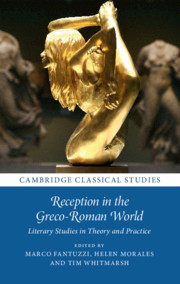Book contents
- Reception in the Greco-Roman World
- Cambridge Classical Studies
- Reception in the Greco-Roman World
- Copyright page
- Dedication
- Contents
- Figures
- Notes on Contributors
- Acknowledgements
- Abbreviations
- Altered States: Cultural Pluralism and Psychosis in Ancient Literary Receptions
- Part I Archaic and Classical Poetics
- Part II Classical Philosophy and Rhetoric, and Their Reception
- Part III Hellenistic and Roman Poetics
- Part IV Multimedia and Intercultural Receptions in the Second Sophistic and Beyond
- Chapter 12 Received into Dance? Parthenius’ Erōtika Pathēmata in the Pantomime Idiom
- Chapter 13 Sappho in Pieces
- Chapter 14 Hesiodic Rhapsody: The Sibylline Oracles
- Chapter 15 Homer and the Precarity of Tradition: Can Jesus Be Achilles?
- References
- Index
Chapter 14 - Hesiodic Rhapsody: The Sibylline Oracles
from Part IV - Multimedia and Intercultural Receptions in the Second Sophistic and Beyond
Published online by Cambridge University Press: 05 June 2021
- Reception in the Greco-Roman World
- Cambridge Classical Studies
- Reception in the Greco-Roman World
- Copyright page
- Dedication
- Contents
- Figures
- Notes on Contributors
- Acknowledgements
- Abbreviations
- Altered States: Cultural Pluralism and Psychosis in Ancient Literary Receptions
- Part I Archaic and Classical Poetics
- Part II Classical Philosophy and Rhetoric, and Their Reception
- Part III Hellenistic and Roman Poetics
- Part IV Multimedia and Intercultural Receptions in the Second Sophistic and Beyond
- Chapter 12 Received into Dance? Parthenius’ Erōtika Pathēmata in the Pantomime Idiom
- Chapter 13 Sappho in Pieces
- Chapter 14 Hesiodic Rhapsody: The Sibylline Oracles
- Chapter 15 Homer and the Precarity of Tradition: Can Jesus Be Achilles?
- References
- Index
Summary
The surviving ‘Judaeo-Christian’ Sibylline Oracles, recomposed over several centuries from the late Hellenistic period onwards, offer an understudied example of overlap between didactic, oracular and universalising strands in ancient Homeric and Hesiodic receptions. This chapter makes a multifaceted case for viewing the Sibylline Oracles as latter-day ‘Hesiodic rhapsody’, whose blend of universal history and ethical exhortation is informed by supra-Homeric perspectives.
- Type
- Chapter
- Information
- Reception in the Greco-Roman WorldLiterary Studies in Theory and Practice, pp. 344 - 370Publisher: Cambridge University PressPrint publication year: 2021
- 1
- Cited by

